Faial Island Getaway
Discover one of the Azores’ most-popular islands on our Faial Island Getaway...
You are here: Home > The Azores > Faial Island Getaway
Discover one of the Azores’ most-popular islands on our Faial Island Getaway.
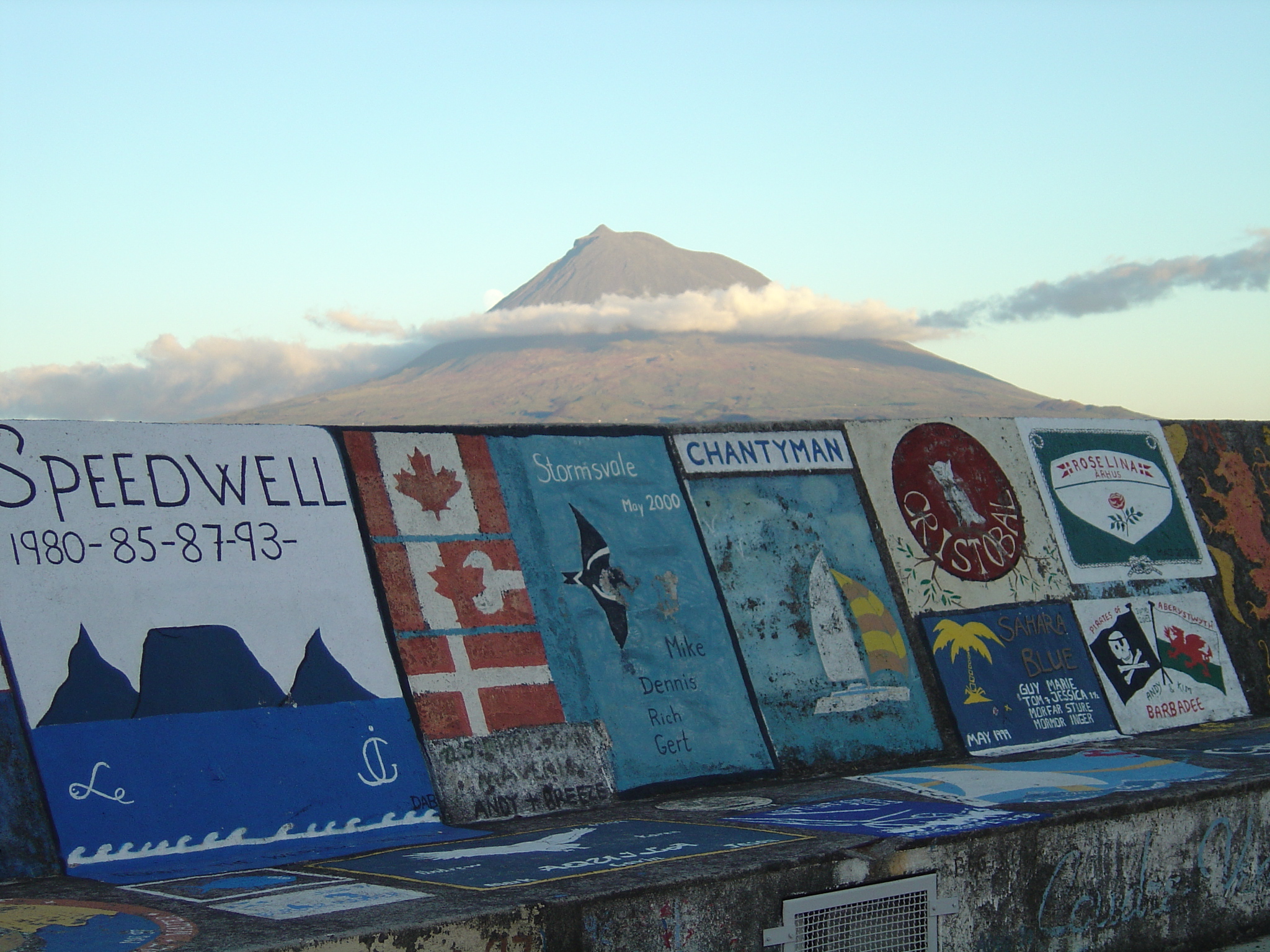 The Azorean island of Faial has held an alluring fascination over visitors to its shores for over four hundred years. Pioneering Flemish settlers chose to abandon their homeland in the mid-1400s in search of a new life in the mid-Atlantic. Spanish forces held dominion over the island in the 1500s, drawing French and English pirates to the island as they raided King Felipe II’s treasure ships at anchor in Porto Pim Bay.
The Azorean island of Faial has held an alluring fascination over visitors to its shores for over four hundred years. Pioneering Flemish settlers chose to abandon their homeland in the mid-1400s in search of a new life in the mid-Atlantic. Spanish forces held dominion over the island in the 1500s, drawing French and English pirates to the island as they raided King Felipe II’s treasure ships at anchor in Porto Pim Bay.
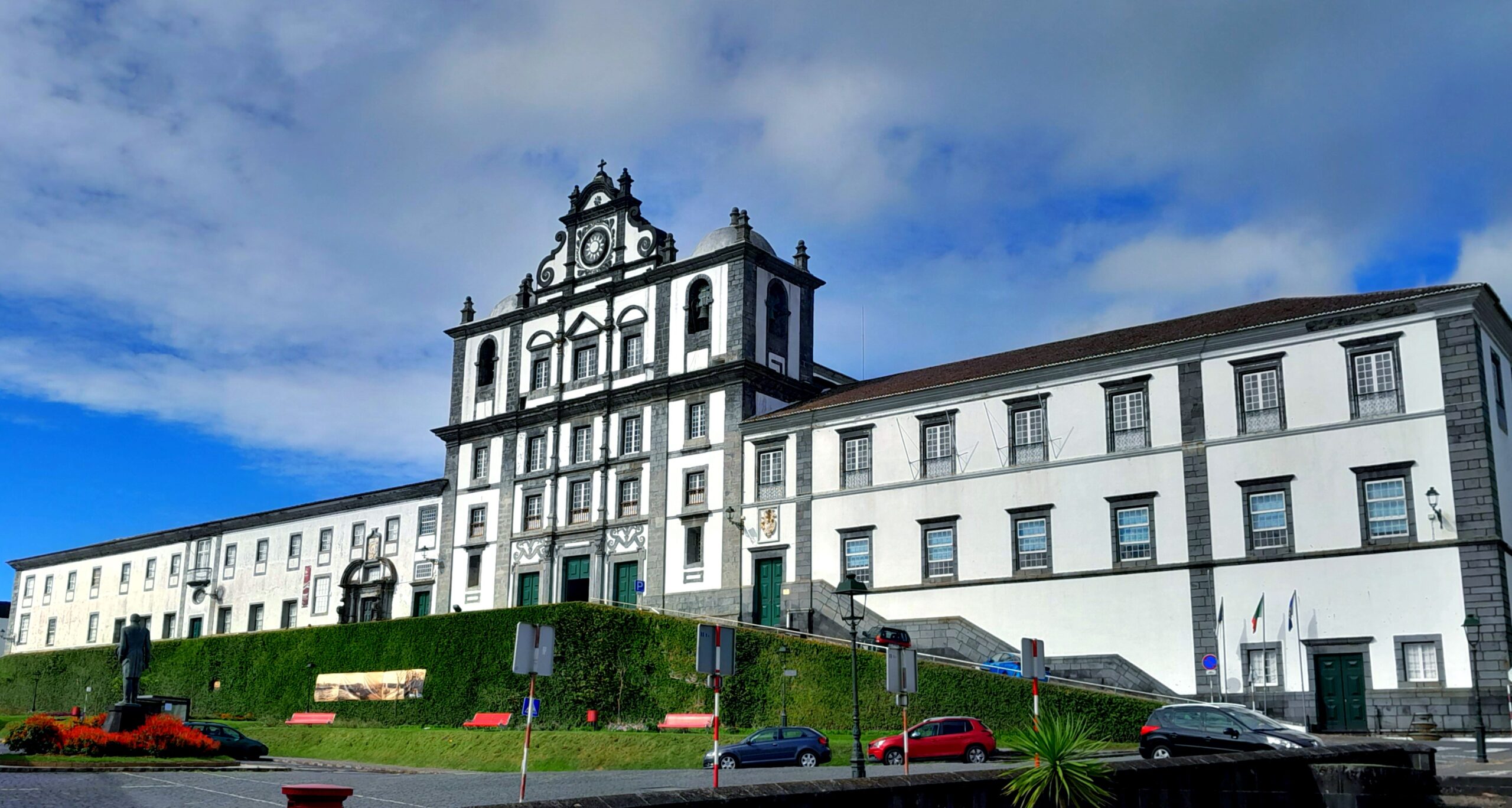 Victorian telegraph magnates built their ostentatious headquarters on the island, and their grand architecture still looks strangely out-of-place on this diminutive western outpost of Europe.
Victorian telegraph magnates built their ostentatious headquarters on the island, and their grand architecture still looks strangely out-of-place on this diminutive western outpost of Europe.
 In the last century, Faial was a safe haven and crucial resupply point for New England whaling fleets and trans-Atlantic sea plane pilots, and the island continues to provide a home-from-home for present-day, 21st century yachtsmen. A warm welcome is also assured for modern-day visitors the island. The main harbour town of Horta is our preferred base – staying at Hotel do Canal or self-catering at the Porto Pim Bay Apartments.
In the last century, Faial was a safe haven and crucial resupply point for New England whaling fleets and trans-Atlantic sea plane pilots, and the island continues to provide a home-from-home for present-day, 21st century yachtsmen. A warm welcome is also assured for modern-day visitors the island. The main harbour town of Horta is our preferred base – staying at Hotel do Canal or self-catering at the Porto Pim Bay Apartments.
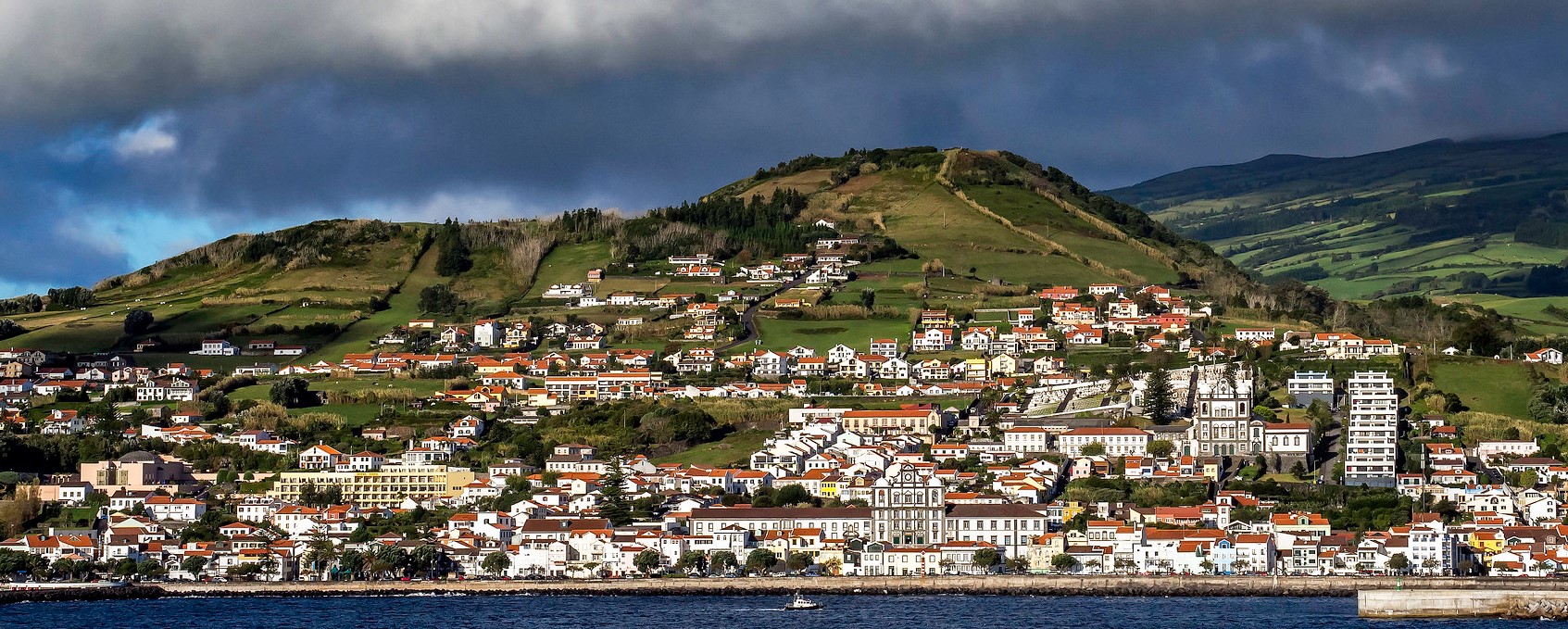 You’ll become a member of the island’s maritime-set with two trips to sea – whale watching in the Faial channel and exploring the island’s volcanic south coast on a sunset boat tour.
You’ll become a member of the island’s maritime-set with two trips to sea – whale watching in the Faial channel and exploring the island’s volcanic south coast on a sunset boat tour.
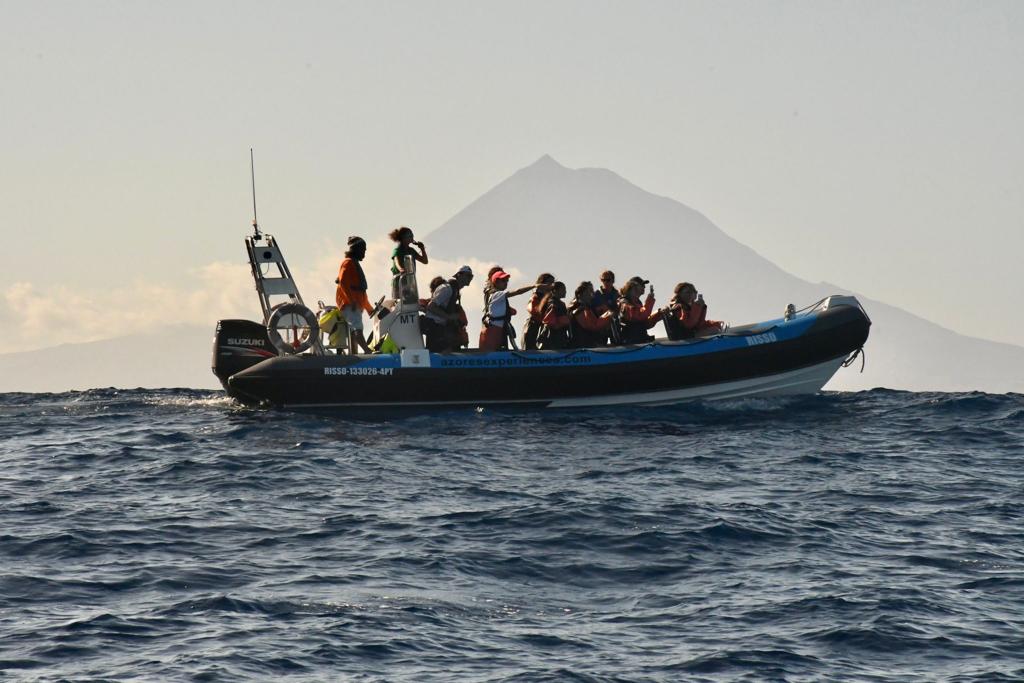
You’ll also learn of the more explosive side of the island’s history with visits to the beautiful Cabeco Gordo caldera and the volcanic peninsula at Capelinhos. We’ll also include a day trip to the neighbouring island of Pico, where you’ll learn more about the Azores’ successful transition from whale hunting to whale tourism.
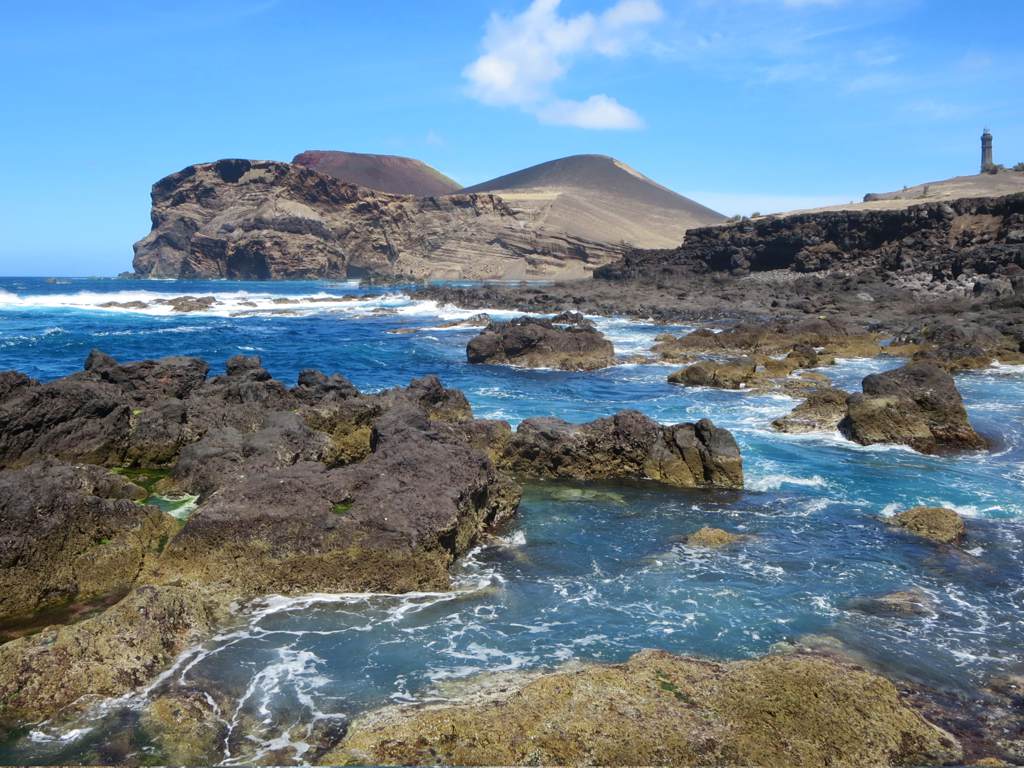 We’ve suggested a seven-night stay – if you’re thinking of a longer holiday, it’s easy for us to combine our Faial Island Getaway with our Best of Sao Miguel Holiday. Just fill out an enquiry form and we’ll do the rest.
We’ve suggested a seven-night stay – if you’re thinking of a longer holiday, it’s easy for us to combine our Faial Island Getaway with our Best of Sao Miguel Holiday. Just fill out an enquiry form and we’ll do the rest.
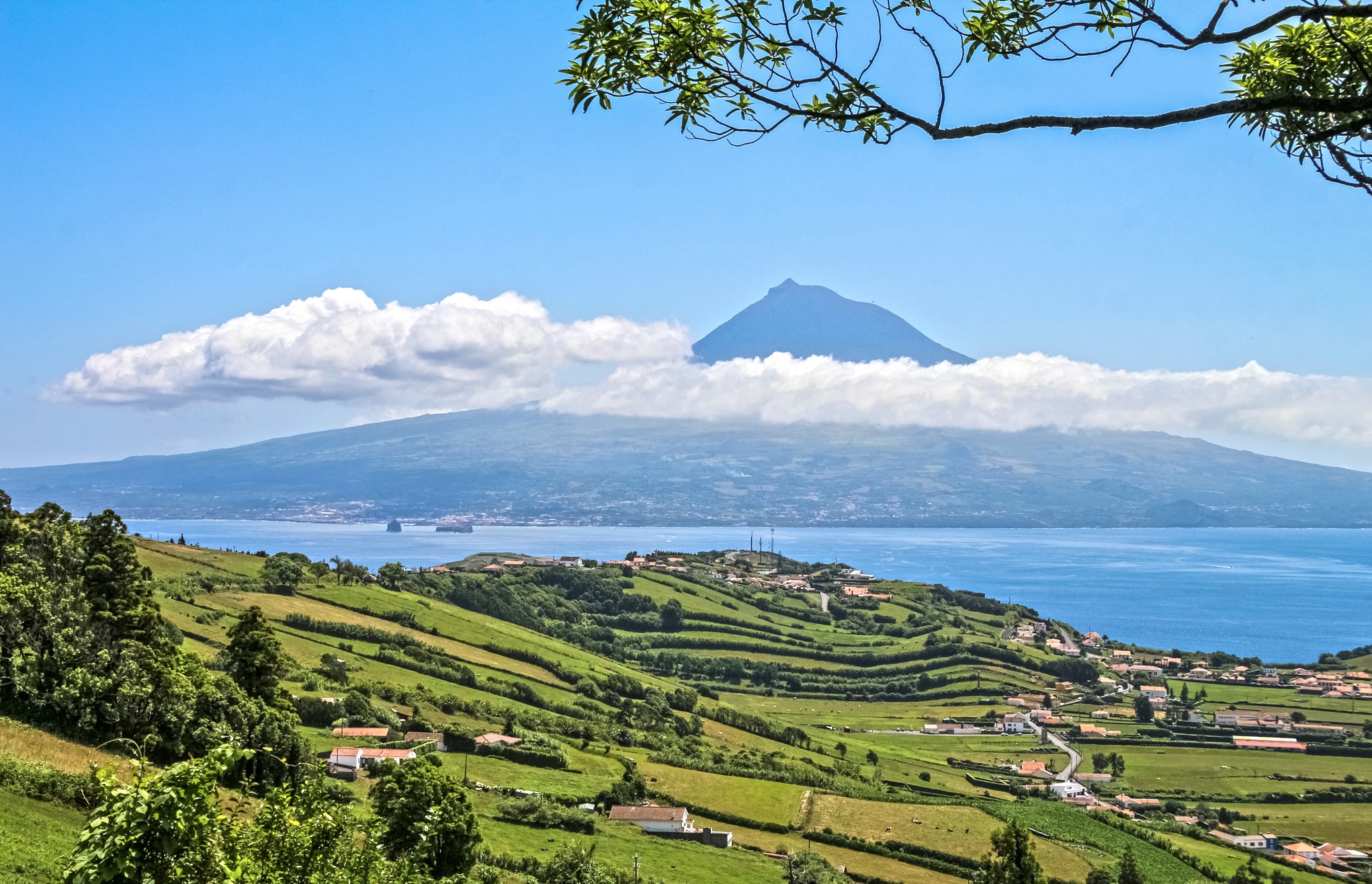
Day 1
You’ll begin your holiday with a flight to the Azorean island of Faial, via Lisbon. You’ll be collected on arrival by our driver for your transfer to the Hotel do Canal in the main harbour town of Horta.
Day 2
For your first morning on the island, we’ll include our guided walking tour of Horta – it’s a great introduction to the city, its layout and its history. Horta was once a crucial transatlantic hub between mainland Portugal and her colonies in Brazil. Modern-day Horta is a popular stop-over point for trans-Atlantic yachts, and it’s tradition for crews to paint a mural on the harbour wall before setting sail.
Day 3
You’ll head to sea on a whale and dolphin watching trip. The seas around the Azores are one of the best places to observe cetaceans and ocean wildlife: bottlenose dolphins, Atlantic-spotted dolphins and sperm whales can be seen throughout the year, with bigger migratory species such as blue and fin whales passing through in the spring.
Day 4
You’ll explore Faial with our resident guide, with visits to the main Cabeço Gordo caldera and the Capelinhos peninsula: the site of the last major volcanic eruption on the island in 1958.
Day 5
You’ll return to sea on our Capelinhos Ocean Tour, visiting the extinct Monte da Guia volcano, the sea caves at Ponta Furada, and Capelinhos. From this ocean viewpoint, you’ll see the full, erosive impact the wind and waves have on the volcanic landscape.
Day 6
You’ll leave Faial today, taking the afternoon ferry from Horta to Madalena on the neighbouring island of Pico. Our driver will collect you on arrival, for the transfer to your new accommodation in the south coast village of Silveira.
Day 7
You’ll explore Pico with our resident guide, with visits to the whalers museum in Lajes do Pico, Lagoa do Capitao, the lava cave at Gruta das Torres, and Pico’s UNESCO-protected vineyards.
Day 8
You’ll be transferred to Pico airport for your flights home, via Lisbon.
Our holidays have a nice balance of activities and free time. Everything’s flexible and you can personalise your trip.
Whale watching
The Azores are one of the premier whale and dolphin watching destinations in the world, with a wide range of species including resident sperm and pilot whales, migratory blue and fin whales, and bottlenose and spotted dolphins.
Walking
Walking is one of the best ways to explore the Azores, and there are guided and self guided walks to suit everyone's level of fitness.
Canyoning
Canyoning is fast growing in popularity and the Azores have excellent routes on Sao Miguel, Sao Jorge and Flores.
Cycling and mountain biking
Cycle from village to village along the quiet roads or take an adrenaline fuelled guided mountain biking ride down from the crater lakes, the Azores have lots of exciting two wheel options.
Jeep tours
Get off-road with our friendly knowledgeable guides along the dirt tracks of the Azores.
Kayaking and Paddle boarding
Kayak and paddleboard on the breathtaking crater lakes or along the rugged coastline of Sao Miguel and Terceira.
Horse riding
From one hour lessons in an indoor arena to full day rides, riding is one of the best ways to explore the Azorean countryside. You'll be riding beautiful pure and cross bred Lusitano horses and be in the safe hands of our experienced guides.
Surfing
With its year round mild climate and sea temperatures, the Azores is starting to become more popular with surfers. Working with a school on the north coast of Sao Miguel, we can provide lessons with our friendly instructors or just hire the boards and wetsuits and ride the waves on your own.
Diving
As well as offering unique diving experiences for qualified divers, beginners can also learn at the excellent schools on the islands. Dive sites are varied from offshore reefs and volcanic caves to drop-offs, impressive arches and flat seabed. Most dives rarely go deeper than 15m and average sea temperatures are 17-22°C. Visibility is very good at 20-25m.
Birdwatching
With close to 400 species sighted in the archipelago, this is a rewarding yet quiet bird watching destination. For many the highlight is spotting the endemic Azores Bullfinch found only in a small part of the main island of Sao Miguel. There's also the large Cory Shearwater and Roseate Tern colonies, Atlantic canary, several subspecies of the Common Chaffinch, the São Miguel Goldcrest and the Azores Woodpigeon. In October, the Azores become the undisputed rarity hotspot of the Western Palearctic with a wealth of America vagrants on offer from shorebirds and wildfowl to wood-warblers and vireos.
Golf
Golfing in the Azores is a real pleasure. Courses are quiet and spectacular offering views over the ocean and volcanic craters. On São Miguel, Batalha overlooks the sea and is the newest and most challenging course while Furnas (located in the mountains at an altitude of 500m) is sprinkled with lakes and stands of Japanese Cryptomeria and then there's the heavily wooded course on Terceira close the beautiful town of Angra.
Discover one of the Azores’ most-popular islands on our Faial Island Getaway.
 The Azorean island of Faial has held an alluring fascination over visitors to its shores for over four hundred years. Pioneering Flemish settlers chose to abandon their homeland in the mid-1400s in search of a new life in the mid-Atlantic. Spanish forces held dominion over the island in the 1500s, drawing French and English pirates to the island as they raided King Felipe II’s treasure ships at anchor in Porto Pim Bay.
The Azorean island of Faial has held an alluring fascination over visitors to its shores for over four hundred years. Pioneering Flemish settlers chose to abandon their homeland in the mid-1400s in search of a new life in the mid-Atlantic. Spanish forces held dominion over the island in the 1500s, drawing French and English pirates to the island as they raided King Felipe II’s treasure ships at anchor in Porto Pim Bay.
 Victorian telegraph magnates built their ostentatious headquarters on the island, and their grand architecture still looks strangely out-of-place on this diminutive western outpost of Europe.
Victorian telegraph magnates built their ostentatious headquarters on the island, and their grand architecture still looks strangely out-of-place on this diminutive western outpost of Europe.
 In the last century, Faial was a safe haven and crucial resupply point for New England whaling fleets and trans-Atlantic sea plane pilots, and the island continues to provide a home-from-home for present-day, 21st century yachtsmen. A warm welcome is also assured for modern-day visitors the island. The main harbour town of Horta is our preferred base – staying at Hotel do Canal or self-catering at the Porto Pim Bay Apartments.
In the last century, Faial was a safe haven and crucial resupply point for New England whaling fleets and trans-Atlantic sea plane pilots, and the island continues to provide a home-from-home for present-day, 21st century yachtsmen. A warm welcome is also assured for modern-day visitors the island. The main harbour town of Horta is our preferred base – staying at Hotel do Canal or self-catering at the Porto Pim Bay Apartments.
 You’ll become a member of the island’s maritime-set with two trips to sea – whale watching in the Faial channel and exploring the island’s volcanic south coast on a sunset boat tour.
You’ll become a member of the island’s maritime-set with two trips to sea – whale watching in the Faial channel and exploring the island’s volcanic south coast on a sunset boat tour.

You’ll also learn of the more explosive side of the island’s history with visits to the beautiful Cabeco Gordo caldera and the volcanic peninsula at Capelinhos. We’ll also include a day trip to the neighbouring island of Pico, where you’ll learn more about the Azores’ successful transition from whale hunting to whale tourism.
 We’ve suggested a seven-night stay – if you’re thinking of a longer holiday, it’s easy for us to combine our Faial Island Getaway with our Best of Sao Miguel Holiday. Just fill out an enquiry form and we’ll do the rest.
We’ve suggested a seven-night stay – if you’re thinking of a longer holiday, it’s easy for us to combine our Faial Island Getaway with our Best of Sao Miguel Holiday. Just fill out an enquiry form and we’ll do the rest.

Day 1
You’ll begin your holiday with a flight to the Azorean island of Faial, via Lisbon. You’ll be collected on arrival by our driver for your transfer to the Hotel do Canal in the main harbour town of Horta.
Day 2
For your first morning on the island, we’ll include our guided walking tour of Horta – it’s a great introduction to the city, its layout and its history. Horta was once a crucial transatlantic hub between mainland Portugal and her colonies in Brazil. Modern-day Horta is a popular stop-over point for trans-Atlantic yachts, and it’s tradition for crews to paint a mural on the harbour wall before setting sail.
Day 3
You’ll head to sea on a whale and dolphin watching trip. The seas around the Azores are one of the best places to observe cetaceans and ocean wildlife: bottlenose dolphins, Atlantic-spotted dolphins and sperm whales can be seen throughout the year, with bigger migratory species such as blue and fin whales passing through in the spring.
Day 4
You’ll explore Faial with our resident guide, with visits to the main Cabeço Gordo caldera and the Capelinhos peninsula: the site of the last major volcanic eruption on the island in 1958.
Day 5
You’ll return to sea on our Capelinhos Ocean Tour, visiting the extinct Monte da Guia volcano, the sea caves at Ponta Furada, and Capelinhos. From this ocean viewpoint, you’ll see the full, erosive impact the wind and waves have on the volcanic landscape.
Day 6
You’ll leave Faial today, taking the afternoon ferry from Horta to Madalena on the neighbouring island of Pico. Our driver will collect you on arrival, for the transfer to your new accommodation in the south coast village of Silveira.
Day 7
You’ll explore Pico with our resident guide, with visits to the whalers museum in Lajes do Pico, Lagoa do Capitao, the lava cave at Gruta das Torres, and Pico’s UNESCO-protected vineyards.
Day 8
You’ll be transferred to Pico airport for your flights home, via Lisbon.
Our holidays have a nice balance of activities and free time. Everything’s flexible and you can personalise your trip.
Whale watching
The Azores are one of the premier whale and dolphin watching destinations in the world, with a wide range of species including resident sperm and pilot whales, migratory blue and fin whales, and bottlenose and spotted dolphins.
Walking
Walking is one of the best ways to explore the Azores, and there are guided and self guided walks to suit everyone's level of fitness.
Canyoning
Canyoning is fast growing in popularity and the Azores have excellent routes on Sao Miguel, Sao Jorge and Flores.
Cycling and mountain biking
Cycle from village to village along the quiet roads or take an adrenaline fuelled guided mountain biking ride down from the crater lakes, the Azores have lots of exciting two wheel options.
Jeep tours
Get off-road with our friendly knowledgeable guides along the dirt tracks of the Azores.
Kayaking and Paddle boarding
Kayak and paddleboard on the breathtaking crater lakes or along the rugged coastline of Sao Miguel and Terceira.
Horse riding
From one hour lessons in an indoor arena to full day rides, riding is one of the best ways to explore the Azorean countryside. You'll be riding beautiful pure and cross bred Lusitano horses and be in the safe hands of our experienced guides.
Surfing
With its year round mild climate and sea temperatures, the Azores is starting to become more popular with surfers. Working with a school on the north coast of Sao Miguel, we can provide lessons with our friendly instructors or just hire the boards and wetsuits and ride the waves on your own.
Diving
As well as offering unique diving experiences for qualified divers, beginners can also learn at the excellent schools on the islands. Dive sites are varied from offshore reefs and volcanic caves to drop-offs, impressive arches and flat seabed. Most dives rarely go deeper than 15m and average sea temperatures are 17-22°C. Visibility is very good at 20-25m.
Birdwatching
With close to 400 species sighted in the archipelago, this is a rewarding yet quiet bird watching destination. For many the highlight is spotting the endemic Azores Bullfinch found only in a small part of the main island of Sao Miguel. There's also the large Cory Shearwater and Roseate Tern colonies, Atlantic canary, several subspecies of the Common Chaffinch, the São Miguel Goldcrest and the Azores Woodpigeon. In October, the Azores become the undisputed rarity hotspot of the Western Palearctic with a wealth of America vagrants on offer from shorebirds and wildfowl to wood-warblers and vireos.
Golf
Golfing in the Azores is a real pleasure. Courses are quiet and spectacular offering views over the ocean and volcanic craters. On São Miguel, Batalha overlooks the sea and is the newest and most challenging course while Furnas (located in the mountains at an altitude of 500m) is sprinkled with lakes and stands of Japanese Cryptomeria and then there's the heavily wooded course on Terceira close the beautiful town of Angra.

